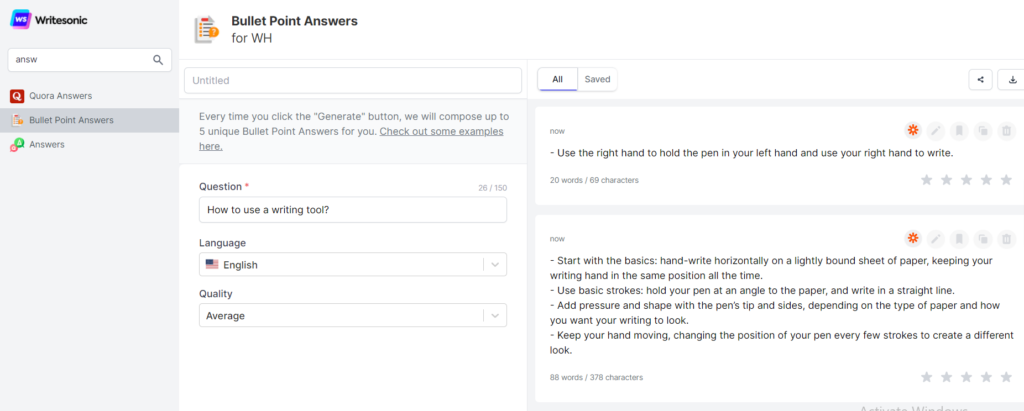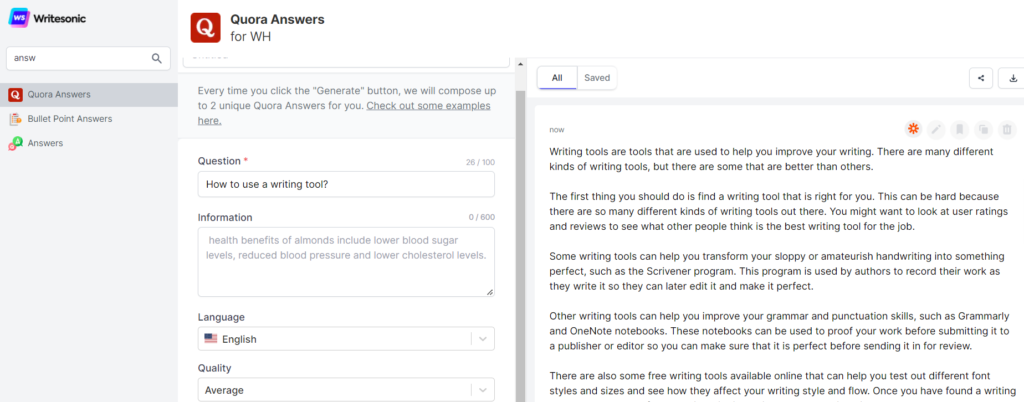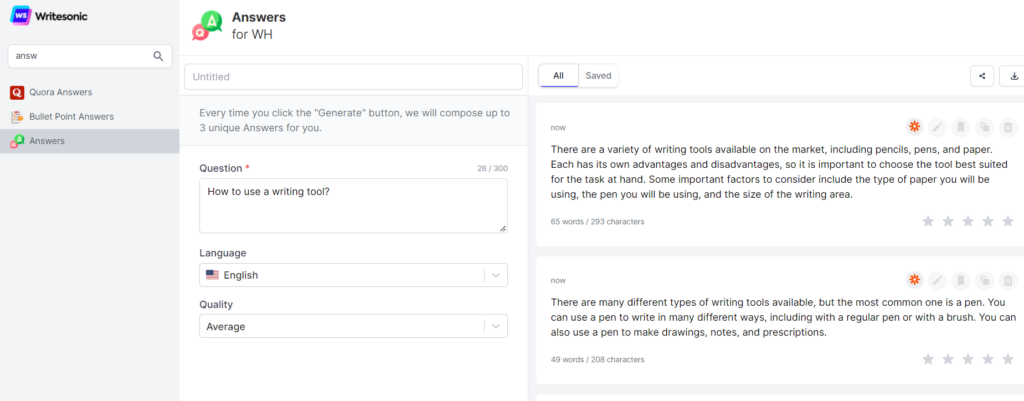
Wondering what the best online tools and resources are for a question to sentence converter? This guide has you covered. Check how to turn questions into sentences and statements!
It’s important to practice skills that help you become a better writer. But you can’t just write sentences – you also have to learn how to turn those sentences into coherent, grammatically correct thoughts. This requires understanding how to use the English language properly.
You need to know how to break down complex ideas into simple, understandable statements. And you need to know how to take those statements and turn them into full-fledged questions. When it comes to writing, this is known as “questioning”.
And it’s an essential skill for anyone who wants to become a better writer. It’s not easy to do well at this. But it can be learned with practice and patience. So use this guide to develop your questioning skills today!
Question to Sentence Converter: Best Free Online Tool – ChatGPT AI

In general, there hasn’t been an online tool that can turn questions into statements, but lately, ChatGPT seems to have the capability to do that.
Let’s break down the process of converting questions into statements/sentences using ChatGPT and provide a practical demonstration.
Steps to convert questions into answer statements using ChatGPT:
- Identify the Question: Before you can convert a question into a statement, you need to clearly identify what the question is. For instance, “What is the capital of France?”
- Ask ChatGPT: Present the question to ChatGPT with a request to rephrase it as a statement. For example, “ChatGPT, can you turn the question ‘What is the capital of France?’ into a statement?”
- Review the Response: ChatGPT will provide a response, which should be a statement form of the original question. For our example, ChatGPT might respond with “The capital of France is Paris.”
Practical Demonstration:
- Original Question: “How old is the Earth?”
- User to ChatGPT prompt: “ChatGPT, can you turn the question ‘How old is the Earth?’ into a statement?”
- ChatGPT’s Response: “The Earth is approximately 4.5 billion years old.”
This method can be applied to a wide range of questions. However, it’s worth noting that the accuracy and appropriateness of the statement will depend on the clarity and specificity of the original question.
Steps to convert questions into declarative sentences using ChatGPT:
If you want to convert a question into a statement without necessarily answering it, you’d be looking to rephrase the question into a declarative form. Here’s how you can do that with ChatGPT:
- Present Your Question: Type out or state the question you want to convert.
- Request Conversion: Ask ChatGPT explicitly to rephrase your question into a declarative sentence without answering it.
- Review the Response: ChatGPT will provide a response that rephrases the question as a statement.
Practical Demonstration:
- User: prompt: “ChatGPT, can you turn the question ‘What is the color of the sky?’ into a declarative sentence?”
- ChatGPT: “You are asking about the color of the sky.” or
Here are other examples of turning questions into statement sentences:
- Turn this question into statement: “Is she coming to the party?”
ChatGPT Statement: “She is coming to the party.”

- Prompt: Turn this question into sentence “Can he drive a car?”
ChatGPT sentence: “He can drive a car.”

- Question: “Did they win the game?”
Statement: “They won the game.” - Question: “Are we allowed to enter the room?”
Statement: “We are allowed to enter the room.” - Question: “Will it rain tomorrow?”
Statement: “It will rain tomorrow.” - Question: “Has she finished her homework?”
Statement: “She has finished her homework.” - Question: “Were you at the concert last night?”
Statement: “You were at the concert last night.” - Question: “Does this dress fit me?”
Statement: “This dress fits me.” - Question: “Have they been to Paris?”
Statement: “They have been to Paris.” - Question: “Should I start the presentation?”
Statement: “You should start the presentation.”
This way, the question is turned into a statement/sentence without directly answering it.
Other ways to turn Question to Statement online for free
Seeking a free question to sentence converter online? Unfortunately, there isn’t an online generating tool that turns a question into a statement other than ChatGPT, but you have other 3 choices:
- You can convert the question manually,
- Rephrase it,
- Or answer it.
There are many ways you can use to create a sentence that is useful for asking questions and generating statements. One of the best ways is by using the sentence builder on WriteSonic.
The sentence builder allows you to build complete sentences by adding or omitting words and phrases. By adjusting the length, order, and type of words, you can create the perfect sentences that are both meaningful and grammatically correct.
Writesonic is the ideal tool for questions and answers since it has AI characteristics.
Check this Question to Answers generator! you can create original answers every time you click “GENERATE“.
When questions can be turned into declarative sentences and when they can become answers
When converting a question into a sentence, the context and type of question play a role in determining whether an answer is required for the transformation. Here are some guidelines:
- Fact-based Questions: For questions that seek a specific piece of information, the answer is often required to form a complete declarative sentence.
- Question: “What is the capital of France?”
- Statement: “The capital of France is Paris.”
- Rhetorical Questions: These are questions that don’t necessarily expect an answer because they are meant to make a point rather than solicit information. They can often be turned into a statement without providing an answer.
- Question: “Who doesn’t love a sunny day?”
- Statement: “Everyone loves a sunny day.”
- Yes/No Questions: For questions that can be answered with a simple “yes” or “no,” you can often form a declarative sentence without explicitly providing an answer, but the statement will imply an answer.
- Question: “Did they win the game?”
- Statement: “They won the game.” (implies “yes”)
- Open-ended Questions: For questions that are more open-ended and don’t have a specific answer, you can often form a declarative sentence without providing an answer.
- Question: “How do you feel about the new policy?”
- Statement: “You have feelings about the new policy.”
- Choice Questions: Questions that present multiple choices might require a bit more finesse. You can turn them into a statement that lists the choices, but without selecting one.
- Question: “Do you want tea or coffee?”
- Statement: “You have a choice between tea and coffee.”
In general, the ability to turn a question into a declarative sentence without providing an answer depends on the nature of the question and the context in which it’s asked.
Differences between question to a sentence, to a statement, and to an answer
- Question to Sentence: Transforming a question into a declarative sentence.
- Question: “Is it raining?”
- Sentence: “It is raining.”
- Question to Statement: Essentially the same as “Question to Sentence.” It involves turning a question into a declarative statement.
- Question: “Do you like apples?”
- Statement: “You like apples.”
- Question to Answer: Providing a response to a question.
- Question: “What is the capital of France?”
- Answer: “Paris.”
So, while “Question to Sentence” and “Question to Statement” are similar concepts, “Question to Answer” is about responding to the query.
Alternative tools to answer your questions
Alternative Tool 1: Question to Bullet Point Answers Generator

Alt 3: Question to Quora Answers

Alt 4: Question to Short Answers

How to Convert Question to Sentence Manually
Converting a question into a sentence is as simple as using a period to make it a statement. This makes the reader more confident in your work and shows them that you know what and how to write.
How do you turn a question into a sentence?
The most common examples of questions in writing are “How?” “Who?” “When?” “Where?” “Why?” and “How come?”
To turn questions into statements, you have to restructure the sentence to make it more straightforward and self-explanatory.
Start by removing the question mark then arrange the phrase in the usual subject-verb-object sequence to make a question into a statement.
Question example: "Are you wearing purple?" Becomes this sentence: "You are wearing purple."
By placing the subject first, then the verb, both inquiries may be made into assertions,
So, apply the same rule, and seek the fundamental components of a sentence: the subject, verb, and object.
Question example 2: "Don't you typically wear purple on Tuesdays?" Becomes this sentence: "You often wear purple on Tuesdays."
The fundamental premise is the same whether the remark is positive or negative
Ways to change a Question into a Sentence:
If you’re writing a question, it can be hard to know when to stop and start a new sentence. Luckily, with some simple techniques, you can change your questions into sentences and make them easier to read.
- Move a helping verb:
For example, “Will we meet again?” It changes to “We’ll meet again.”
- Removing Does, Do, and Did:
Such as “Did he receive the best grade in the class?”. Becomes: “He received the best grade in the class,” then.
- Removing question words:
Like: “When are you going back to your exercise?”. Becomes: “You are going back to your exercise”
How do you restate a question in a sentence? (video)
What is an example of a turned question to a sentence?
| Question | Question to Sentence |
|---|---|
| Have you not noticed me moving? | You didn’t notice me moving. |
| Has she not yet arrived? | She hasn’t yet arrived. |
| Has aging been kind to us? | Age has been kind to us. |
| Does the number 11 bus stop here? | The number 11 bus stops here. |
| When will you return to your house? | You will you return to your house. |
How to turn a question into a statement
How can you turn a question into a statement? You can use a question to prompt someone to think about a specific topic and then use that thought to generate statements about that topic. Here are some techniques to convert question to statement:
- State the question in a declarative sentence.
- Start with the subject, “What are some benefits of yoga?”
- Use phrases such as “some people” or “many people” to refer to a group.
- End the sentence with a topic sentence.
“What are some benefits of yoga?” can be turned into a statement by stating “Some people find yoga to be beneficial.”
If you can’t explain something in a way that makes sense, change the question to an answer statement.
- For example, if someone asks “How to lose weight?”, say: “I lost weight by eating less and exercising more.”
- Alternatively, if someone asks “How to study?”, say: “I study by spending time before class to prepare.”
Creative ways to change question to statement
A statement is a brief and direct answer to a question. It contains facts, ideas and opinions but has no emotion or unnecessary details.
To turn a question into a statement, here are some tips:
- Start your statement with a hook, such as ‘According to research…’ or ‘In my experience…’. This makes your sentence more interesting and catches the reader’s attention.
- State the question in your own words first, then answer it using facts and examples from the research or your experience. This shows that you know what you are talking about.
- Finish your statement by summing up the main points of the question, in your own words.
How do you flip a question? (video)
What is a Question to Sentence Converter?
A “Question to Sentence converter” is a tool or software that transforms interrogative sentences (questions) into declarative ones (statements), maintaining the core information. This is useful for summarizing, data processing, or language learning.
For example, the question “What is the capital of France?” would be converted to “The capital of France is Paris.”
In addition to summarizing and data processing, a Question to Sentence tool is also valuable for preparing responses or turning questions into thesis statements.
For instance, in academic or presentation settings, converting the question “How does photosynthesis work?” into the statement “Photosynthesis works by converting light energy into chemical energy in plants” helps in formulating a clear, focused answer or thesis.
The sentences will be related to the topic of the question. These types of online tools help users to understand a topic better. These are free to use and are available for every topic.
This question-to-sentence/answer converter help in developing vocabulary and boosting knowledge.
This question-to-sentence/answer converter tool are extremely helpful for people who have just started learning a new subject. In these converter tools, users can type in their questions and get their answers related to the same topic.
However, not many people know about this type of online tools or how they work. This is why we have decided to write this guide about it so that it doesn’t remain hidden any longer.
Keep reading to find out more information about these online tools and why they are useful for beginners as well as professionals across various fields.
How does turning questions into sentence generators work?
These question-to-sentence and question-to-answer converters and tools basically provide users with a set of sentences related to a particular topic. Users can then copy and paste the sentences into a new paragraph and create their own essays based on these sentences.
This way, users can learn new vocabulary, understand complex topics, and write essays. These question-to-sentences/answers converter tools have a set of grammar rules and an algorithm that is used to extract sentences from a specific topic and convert it into a form that is easy to understand.
These algorithms are based on natural language processing (NLP) techniques, so they understand the nuances of sentences and convert them into a form that is easy to understand.
The greatest conversion tools paraphrase, extend, answer, or summarize a topic or question. So, learn below about question paraphrasing and the best tools on the web.
Check also: Turn sentences to question converter generator
FAQs (Frequently Asked Questions)
Is it possible to learn new vocabulary while using these sentence converter tools?
Yes, these sentence converter tools help users to convert questions into simple sentences and make them understand the topic better. This way, users can learn new vocabulary related to the topic and expand their vocabulary.
Are question to sentence converter tools free to use?
Yes, these question to sentence converter tools are completely free to use. Users don’t need to pay a single penny to use these question to sentence converter tools. However, you may improve your plans if you need to extend your user experience.
How to Make a Sentence from a Question
When you take a test, it’s not just about knowing the information. It’s also about being able to use your knowledge and reasoning skills. Many tests have questions that require you to think logically and come up with the best possible answer.
Even if you don’t enjoy doing it, having to think on your feet and answer questions quickly is a great way to test your ability to solve problems.
The same is true for writing essays, research papers, and even short answers for tests. If you’re asked to write an essay from a question instead of answering it directly, try turning the question into its own sentence or phrase so that it allows more space for explanation.
You can find out all you need to know about turning a question into a statement by looking the guidance further above.
What is a Question
A question is basically a word or a phrase that starts with a word or letter that you are trying to find out something about.
A question is a statement that asks for information. It can be asked in the form of a question word or phrase, such as “Why did she leave?” or “When does the movie start?”. It can also be asked in the form of an interrogative clause, such as “Who won the game?” or “What did you see in the movie?”. In either case, it is a statement that requests information.
What are the 4 types of questions?
These different types of questions will be further explained below. No matter what language you speak, questions are an important part of communication. In English, there are many different types of questions, each with a different purpose.
- General or Yes/No Questions: These are the most common type of question in English.
- Special or Wh-Questions: These are questions that begin with ‘who,’ ‘what,’ or ‘when.’
- Choice Questions: These are questions that request a choice between two options.
- Disjunctive or Tag Questions: These are questions that form with a conjunctive adverb.
>> Check these examples for the above types of questions!
What is a Sentence
A sentence is basically a complete thought that contains a subject, verb, and object. They are often referred to as clauses. A sentence is basically a combination of two or more clauses together to create a complete thought.
For example, “I am reading a book” is a complete sentence because it has a subject (“I”), a verb (“am”), and an object (“reading”). This is the basic definition of a sentence.
A sentence is also defined as “a group of words with a topic and a connection between the words and also called as a connective word or a conjunction”.
- There are no two sentences that are exactly the same.
- The main purpose of a sentence is to convey a meaning or an idea.
- The words used in a sentence can be nouns, pronouns, verbs, adjectives, adverbs, etc.
What is a Question to Sentence
A question to sentence is basically a question that has been made into a sentence. This is very useful for those who are new to the subject they are studying and don’t know how to convert questions into sentences.
The best way to do this is by using a question, but changing the words to make it a sentence.
For example, if you want to convert a question about “why are you reading a book?” into a sentence, you can simply change it to “you are reading a book”,
Why using sentences instead of questions?
There are several reasons why you should convert your questions into sentences as opposed to just leaving it as a question.
– First, there are fewer mistakes when converting a question into a sentence than when converting a sentence into a question.
– Second, the major purpose of converting a question into a sentence is to help at the beginning of your responses since the ideal method to respond to a question is to restate it as a sentence before attempting to respond.
– Finally, converting a question into a sentence gives you more freedom to write the sentence in any way you want. This is because the question does not have any specific rules you need to follow when writing the sentence. In other words, you can write the sentence in any way you want so that it sounds right and is grammatically correct.
Why converting questions into sentences
Most professors want their students to be able to rephrase the question in their answers. It is crucial to ensure that students write entire sentences. The following are the reasons for restating questions:
- Restating a question involves repeating it if it is brief, or rephrasing it if it is longer.
- You should rephrase questions to guarantee perfect comprehension and to give yourself time to ponder before responding.
- It also assists you in answering the exact question that has been posed.
[See: Examples of Paraphrasing Sentences– List]
Final Thoughts
These question to sentence converter tools are extremely helpful for people who have just started learning a new subject. These tools help users to convert their questions into simple sentences and make them understand the topic better.
These tools are perfect for those who want to learn new vocabulary, expand their vocabulary, and learn new topics. People can use these question-to-sentence converter tools to learn new languages, improve their writing skills, and write essays related to a particular topic.
If you have any questions or difficulties in converting a question into a sentence, then you can use these question to sentence/answer converter online tools.
These online tools are very helpful in converting questions into sentences and are perfect for beginners as well as professionals across various fields. They are very easy to use and have an intuitive interface.
Even if you have no idea how to convert a question into a sentence, you can easily use these question to sentence converter online tools because they are very user-friendly.
Paraphrasing questions is a helpful strategy that can help you better understand what others are trying to say. You can also use this technique to rephrase your own sentences to better understand what you’re writing. These are all great ways to improve your reading and writing skills.
There are many tools you can use to help you practice your paraphrasing skills. The best ones are easy to use and have a large library of content to choose from. You can use the above tools to help you practice any kind of sentence or question.
